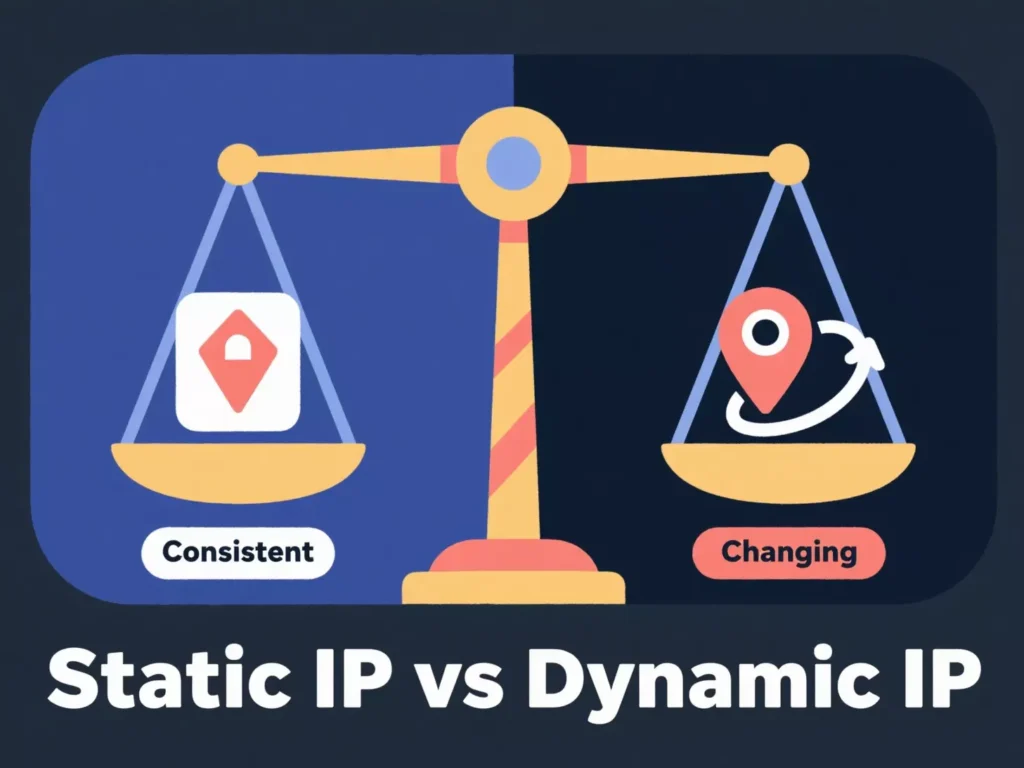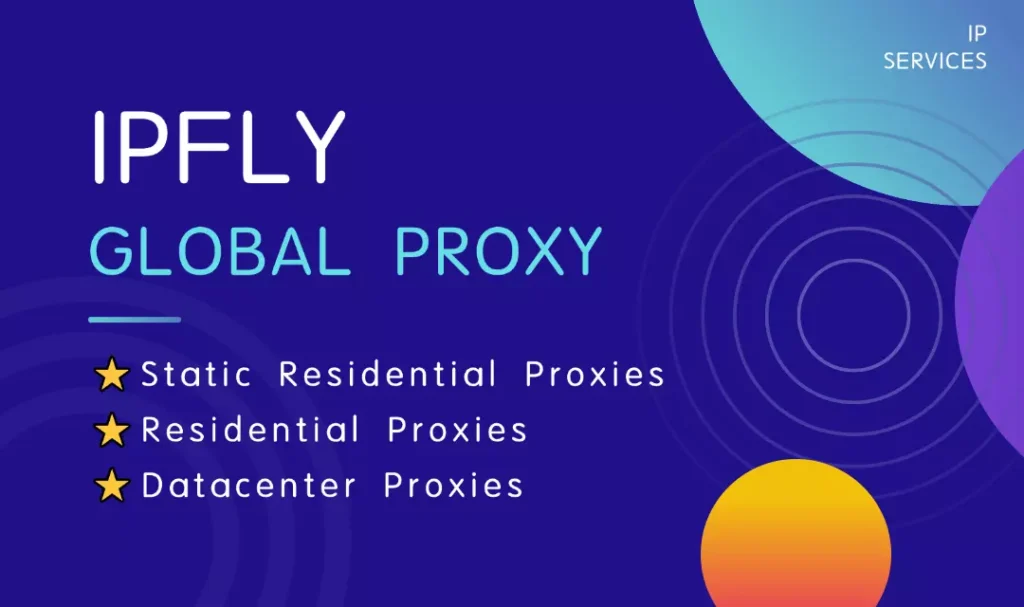Every device on the internet is assigned an IP address — a unique identifier that enables communication. This IP can either be static, meaning it remains constant, or dynamic, meaning it rotates over time. Choosing between these two types affects everything from privacy and security to hosting reliability and online experience.
This article explores the differences, pros and cons, and ideal use cases for both static and dynamic IPs. It also highlights how providers like IPFLY offer tailored proxy solutions—such as static residential IPs and dynamic proxies—which blend stability, anonymity, and performance.

What Is a Static IP?
A static IP address is one that never changes. Once it’s assigned to a device, it stays the same until manually altered by a network administrator or your internet service provider (ISP).
This type of IP is common in business settings and for services that require constant accessibility, such as:
- Hosting a website or application
- Running an email server
- Connecting via VPN for remote work
- Managing security cameras or IoT devices
Because it doesn’t change, a static IP provides predictability — a crucial factor for network configuration, remote access, and uptime.
What Is a Dynamic IP?
A dynamic IP address changes periodically, usually every time you reconnect to the internet or at regular intervals determined by your ISP’s DHCP server.
Dynamic IPs are the default for most internet users because they:
- Are easier for ISPs to manage
- Save address space
- Offer more privacy through rotation
For casual users who browse, stream, and game without hosting services, a dynamic IP is often the simplest and most cost-effective choice.
Advantages of Static IP
1. Consistency for Hosting
If you’re hosting a website, game server, or application, a static IP ensures that DNS records don’t need constant updating. This stability reduces downtime and helps users reliably connect.
2. Easier Remote Access
A fixed address makes remote desktop connections and VPN access straightforward. IT teams can configure firewalls and access lists without worrying about address changes.
3. Better Email Deliverability
Dynamic IPs often share addresses among many users, and one bad actor can get the IP blacklisted. With a static IP, you can maintain a clean sending reputation, improving the chances that your emails land in inboxes rather than spam folders.
4. Stability for Gaming and VoIP
Latency-sensitive services like online gaming and video calls benefit from a stable IP that doesn’t reset unexpectedly.
Advantages of Dynamic IP
1. Lower Cost
Dynamic IPs are typically included in your standard internet plan, while static IPs often cost extra.
2. Enhanced Privacy
Because your IP changes, it’s harder for websites and advertisers to track you long-term.
3. Automatic Configuration
No manual setup is required — your ISP assigns and updates your IP automatically.
Drawbacks to Consider
| Feature | Static IP | Dynamic IP |
| Cost | Higher | Lower |
| Privacy | Easier to track | Harder to track |
| Security | Easier target if unprotected | Safer from repeated targeting |
| Setup | Manual | Automatic |
| Hosting | Ideal | Not ideal |
Static IPs can be vulnerable because they’re constant, making them easier targets for repeated attacks. On the other hand, dynamic IPs can be inconvenient for hosting and long-term access because the address changes.
Security Considerations
Security is a key factor in this debate. A static IP is easier for attackers to target because it doesn’t change, but this risk can be managed through:
- Firewalls
- VPN encryption
- Intrusion detection systems
Many users combine static IP benefits with extra layers of protection using proxy services like IPFLY. IPFLY can provide a static IP through a secure proxy server, masking your real address while giving you consistent accessibility. This adds encryption and allows you to choose from global locations — making it harder for attackers to pinpoint your network.
Choosing Based on Your Needs
Use a Static IP if you:
- Run servers or services accessible remotely
- Require predictable network access
- Host sensitive or real-time applications
Use a Dynamic IP if you:
- Mainly browse, stream, or game
- Prioritize cost and simplicity
- Value rotating privacy without added tools
Use a Static IP Proxy from IPFLY if you:
- Want the reliability of a fixed IP without exposing your actual address
- Need global IP coverage for marketing, scraping, or localization
- Want seamless setup, strong anonymity, and flexibility
How IPFLY Enables Static IP Flexibility

IPFLY offers:
- Static Residential Proxies (ISP-level): Over 10 million real high-quality IPs in 30+ countries, providing stable, dedicated connections.
- Dynamic Residential Proxies: A vast pool of over 90 million residential IPs across 190+ countries, rotating to conceal identity while maintaining global reach.
- Data Center Proxies: More than 2 million high-performance IPs in 90+ countries for large-scale, fast tasks.
IPFLY emphasizes fast, stable, and high-availability proxy services suitable for web scraping, SEO, ad verification, and e-commerce. Their design also supports multiple protocols (HTTP, HTTPS, SOCKS5), with customizable configurations available through a user-friendly dashboard.
With IPFLY, users can choose static or dynamic IP settings based on task needs, making their solution highly flexible compared to standard ISP offerings.
Best Practices When Using IPFLY
- Define Your Objective: Choose static residential proxies for reliable access, or dynamic proxies for anonymity and rotation.
- Select Target Regions: IPFLY allows precise geolocation targeting—ideal for localization or regional testing.
- Secure Your Setup: Use secure authentication and rotation settings to maximize privacy.
- Monitor Performance: Use the IPFLY dashboard to manage proxy usage, usage data, and connection stats.
- Plan for Scalability: IPFLY’s widespread IP network makes it easy to scale up for data-intensive tasks or global coverage.
Conclusion

Static and dynamic IPs serve different roles in modern networking. Static IPs offer access consistency, vital for hosting and remote operations; dynamic IPs provide cost-effectiveness and privacy. With providers like IPFLYoffering both static residential proxies and dynamic IP pools, it’s possible to tailor your proxy setup to fit your evolving needs — combining reliability and anonymity effectively.
Join IPFLY’s Telegram channeland never miss important proxy trends again.


